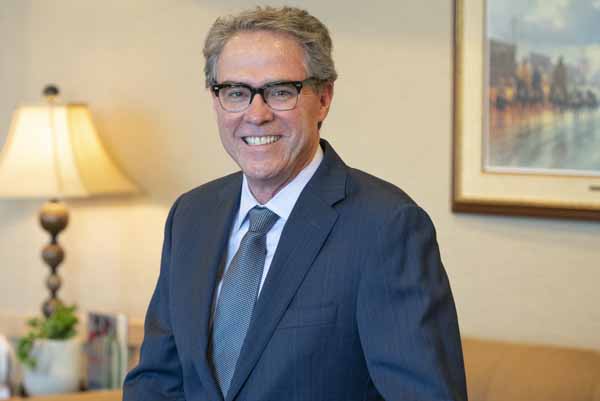
On Jan. 1, 1997, just as Louis J. Goodman, PhD, took over as the Texas Medical Association’s chief executive, Michael J. Darrouzet started as CEO of the Dallas County Medical Society (DCMS).
In an unpredictable twist of fate, on Sept. 1, Mr. Darrouzet assumed the helm as TMA’s new chief executive after Dr. Goodman retired. But just like his predecessor, physicians are the ones he wants front and center.
“The thing that drives me is, this is the physicians’ organization, and we need to encourage them and let them know they can lead. They can teach us a lot, and we are going to listen,” Mr. Darrouzet told TMA staff his first week on the job.
He credits his 31 years in organized medicine with preparing him to mobilize TMA’s nearly 53,000 members for what’s ahead, already having led the nation’s second largest county medical society through several major shifts in health care.
“Having the long view has given me perspective on the life of a physician. They have relationships with patients that last from childhood to adulthood, and really, organized medicine is kind of the same. It’s a commitment to the life of a physician practice,” Mr. Darrouzet, who earned his degrees in finance and health care administration from The University of Texas at Austin and Trinity University in San Antonio, respectively, told Texas Medicine.
He applies the same deliberation to his hobby of crafting acoustic guitars. But don’t expect him to take the limelight at TexMed any time soon. “I have a separation of church and state,” he laughed.
Here are more highlights from Texas Medicine’s interview.
How have three decades in organized medicine shaped you as a leader? What were some stepping-stones?
There were several significant advocacy efforts during the late 1990s that stand out. One was the merger of Aetna and Prudential. We decided to fight that because Aetna would have had over 50% of the market in Dallas-Fort Worth and in Houston … and they were the only two markets in the nation where that merger was not allowed to take place. That changed the idea of what the medical society could do in terms of advocacy. Very quickly after, Aetna expanded its all-products clause. That phenomenon was the first time AMA, TMA, and DCMS came together to fight … and Aetna withdrew its all-products clause in Texas. Those two things happened very quickly after I started as CEO [at DCMS] and set a tone for very aggressive advocacy. That led to TMA getting more active in First Tuesdays, and we had a lot more physicians involved in socioeconomic advocacy, not just political advocacy.
Was Dallas a microcosm for the kinds of issues a state association faces?
There were some unique things about Dallas-Fort Worth that played a role. DCMS is the second largest county society in the country. And [Dallas-Fort Worth] has the most Fortune-500 companies outside of New York or Delaware. There’s a huge concentration of very large, multi-national, and national companies that are ERISA-exempt; they set their own policies, and it’s a very sophisticated corporate market. Those factors, combined with six major health systems, created an environment that trained me to deal with multi-faceted, complex industries. And many states have fewer doctors than DCMS. So we were dealing with very large issues, large medical groups, and large numbers of patients.
What were some of DCMS’ accomplishments in your tenure?
Project Access was a very well-coordinated (charity care) project that in old terms you would consider an HMO for the poor, and today you might call it an ACO or a medical home with care coordination, care navigation, pharmacy benefits – things that today, value-based care is based upon. That was a 13-year run that defined a lot of what physicians can do to help vulnerable patients and what an organization can do to help physicians.
We were also able to bring back a very significant role for physicians in public health because of several big crises. One was the largest West Nile virus outbreak in the nation’s history. DCMS was instrumental in getting airplanes in the air to aerial spray Dallas County [for mosquitos]. The fear factor was high, and we were able to follow the science on that kind of intervention. The second was the national Ebola crisis. Talk about absolute fear. No one believed or trusted the public health department; no one trusted the hospital; no one trusted the city; no one trusted the CDC (Centers for Disease Control and Prevention). The only group people trusted was the physicians, and that’s why you saw three or four of our leaders on national news every hour.
How do you plan to mobilize TMA members in a similar way?
These are very complicated issues, but the people who know the answers are the physicians. What I like to do is bring those doctors together to create model solutions. Now, when it’s a crisis, you’re in response mode. But when you’re not in a crisis, you can do a lot of successful planning. This is my dream for TMA: to have physicians involved in the modeling of solutions. We need to be proactive about coming up with ways we would like to solve health insurance coverage, Medicaid, mental health system redesign, the list goes on. So whatever does happen, at least it’s informed by physician opinion with guiding principles and basic requirements.
Tex Med. 2019;115(11):6-7
November 2019 Texas Medicine Contents
Texas Medicine Main Page
Amy Lynn Sorrel
Associate Vice President, Editorial Strategy & Programming
Division of Communications and Marketing
(512) 370-1384